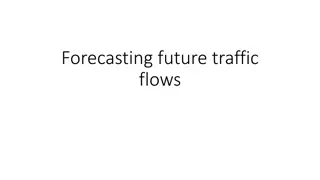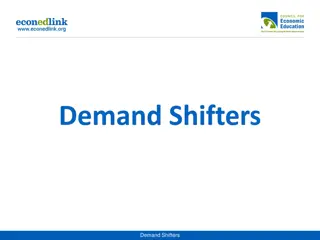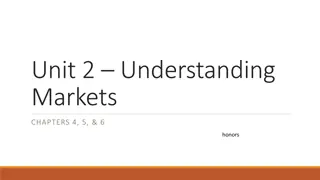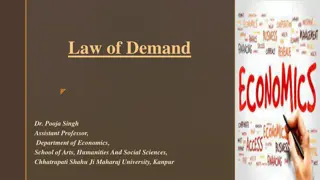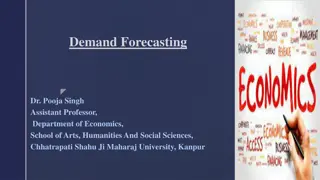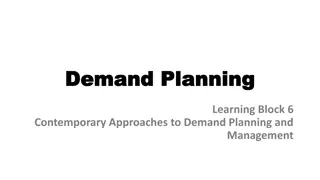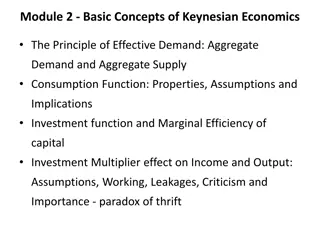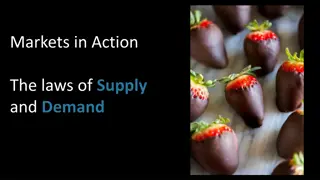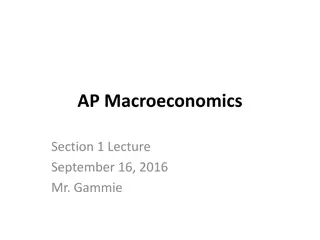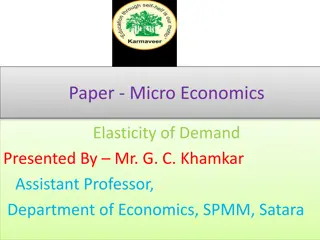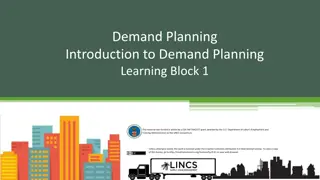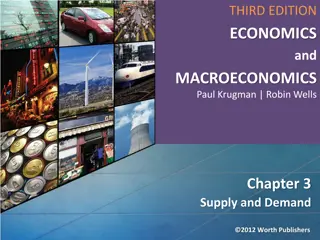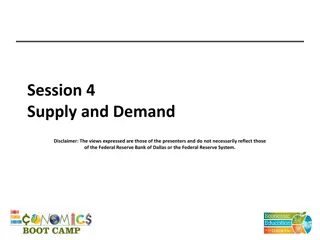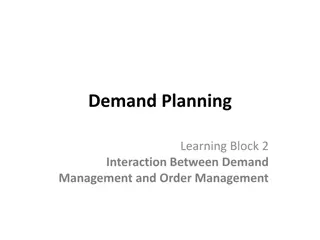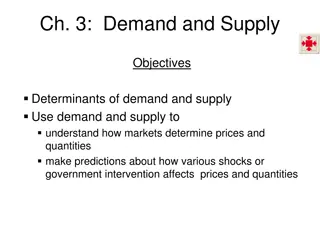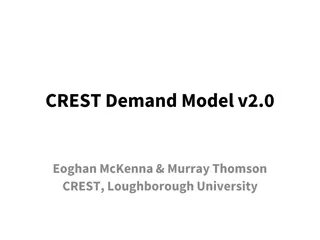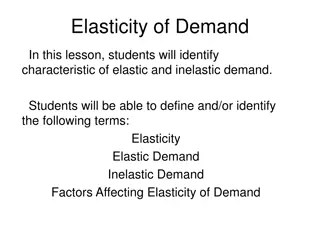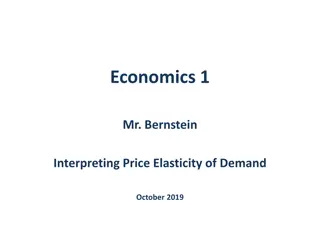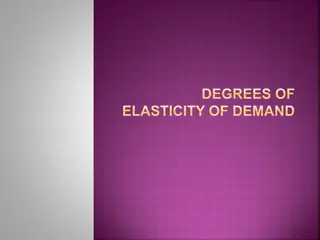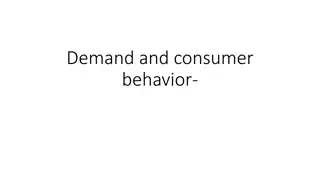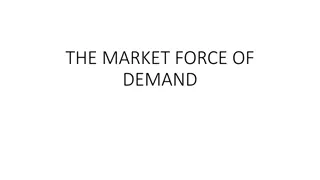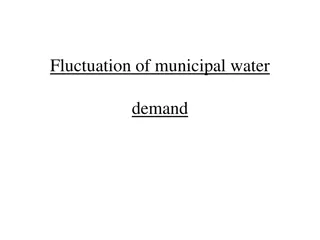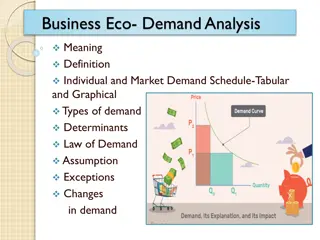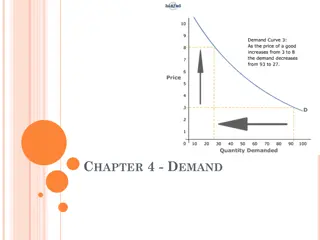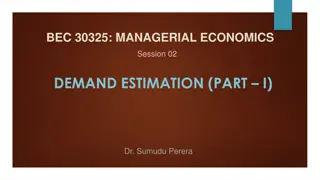Demand Estimation and Demand Forecasting
Demand estimation and forecasting are crucial processes for businesses to predict future demand for their products or services. Demand estimation involves analyzing the impact of various variables on demand levels and pricing strategies, while demand forecasting helps in planning production, new pro
0 views • 7 slides
INVENTORY MANAGEMENT.
Managing inventory under ISO 15189 guidelines involves Quantity, Quality, and Process management. Key aspects include demand forecasting, inventory movement control, consumption planning, and ensuring fitness for purpose. Quantity management aims to balance demand and supply, manage supply economics
5 views • 13 slides
Principles of Traffic Demand Analysis and Highway Demand Forecasting
Understanding traffic flows is crucial in designing highways and managing traffic effectively. Traffic demand analysis involves forecasting future traffic volumes, modeling demand, and determining the necessary infrastructure improvements. This analysis helps in estimating axle loadings, pavement th
0 views • 36 slides
Understanding Demand Shifters in Economics
Explore the concept of demand shifters in economics, including the factors that influence changes in demand such as consumer income, number of consumers, prices of substitute and complimentary goods, consumer preferences, and expectations. Learn how changes in these factors impact the quantity deman
0 views • 14 slides
Understanding Markets: Demand and Consumer Behavior
Explore the concepts of demand, consumer behavior, and the factors influencing purchasing decisions in markets. Covering topics such as the law of demand, individual demand curves, marginal utility, and overcoming obstacles to buying, this educational material delves into the intricacies of supply a
1 views • 28 slides
Understanding Demand in Economics: Chapter 4 Overview
Demand in economics is dictated by the law of demand, where lower prices lead to increased purchases and vice versa. This chapter delves into the factors influencing demand, such as substitution effects, income effects, demand schedules, and market demand. Learn how shifts in the demand curve impact
0 views • 26 slides
Understanding the Law of Demand in Economics
The Law of Demand, explained by Dr. Pooja Singh, Assistant Professor at Chhatrapati Shahu Ji Maharaj University, Kanpur, outlines the inverse relationship between the price of a commodity and the quantity demanded. This fundamental economic principle states that as the price of a product decreases,
0 views • 9 slides
Factors Affecting Seed Marketing and Demand in Agriculture Sector
Factors affecting seed marketing include clear-cut policy, availability of adapted varieties, production and storage facilities, official programs, and demand forecasting. Components such as cropping patterns, climate, market situation, and farm income levels influence seed demand. Effective demand
5 views • 7 slides
Understanding Demand Forecasting for Better Business Planning
Demand forecasting is a crucial aspect of business decision-making, allowing organizations to estimate future demand for their products or services. Dr. Pooja Singh, an Assistant Professor at Chhatrapati Shahu Ji Maharaj University in Kanpur, explains the art and methods of demand forecasting, its u
0 views • 9 slides
Contemporary Approaches to Demand Planning and Management
Relatively recent developments in supply chain processes aim to enhance demand planning and management. Collaborative Planning, Forecasting, and Replenishment (CPFR) facilitate closer supplier-customer coordination to optimize forecasts, production, and orders. Understanding CPFR, pull versus push s
0 views • 23 slides
Understanding Keynesian Economics: Effective Demand and Aggregate Supply
Keynesian economics emphasizes the importance of effective demand in determining income, output, and employment levels. Effective demand, as outlined by Keynes, is the equilibrium level of demand that is met by aggregate supply to maintain stable employment and output levels. It is influenced by fac
0 views • 37 slides
The Hidden Benefit of Cool Roofs in Reducing Peak Energy Demand
Commercial building owners can reduce peak energy demand by installing cool roofs, leading to lower electricity costs and environmental benefits. Peak energy demand can strain the power grid, require additional capacity, and result in higher electricity rates. By understanding base use and peak dema
0 views • 31 slides
Understanding the Law of Demand in Markets
Markets in action demonstrate the laws of supply and demand, where buyers and sellers interact to determine economic output and price. The law of demand states that as prices rise, the quantity demanded decreases, leading to contraction, and vice versa. Through an example of chocolate-covered strawb
0 views • 25 slides
Understanding Demand in Macroeconomics: Key Concepts and Laws
Exploring the fundamental concepts of demand in AP Macroeconomics, including quantity demanded, demand schedules, the law of demand, and key terms. Practice questions help reinforce learning by testing knowledge on factors affecting demand for various goods. Through visual aids and explanations, rea
0 views • 17 slides
Understanding Elasticity of Demand in Microeconomics
Elasticity of demand in microeconomics explores the qualitative and quantitative relationships between demand and price. It examines how changes in various factors affect consumer behavior and demand for goods and services. Factors such as price, consumer income, prices of related commodities, numbe
0 views • 8 slides
Understanding Demand Planning in Supply Chain Management
Demand planning is crucial for company success, involving estimating anticipated demand, factors affecting demand, key roles and skills, and responsibilities. This process aligns organizations with expected demand, optimizes supply chain activities, and ensures sufficient resources to meet customer
0 views • 195 slides
Understanding Supply and Demand in a Competitive Market
This content delves into the concept of supply and demand in a competitive market as described by the renowned economists Paul Krugman and Robin Wells. It covers the basics of a competitive market, the dynamics of supply and demand curves, movements along curves, market equilibrium, and how prices a
0 views • 42 slides
Understanding Supply and Demand in Economics
Exploring the interaction of supply, demand, and price in economics through topics such as market dynamics, characteristics of competitive markets, the law of demand, determinants of demand, and shifting demand. Gain insights into how changes in price and various factors affect supply and demand equ
0 views • 24 slides
Demand Planning and Order Management: Enhancing Efficiency
Explore the intricate relationship between demand planning and order management, crucial for optimizing customer order fulfillment cycles. Learn key principles, tools, and techniques to enhance communication and manage demand effectively, along with contemporary approaches and e-commerce fulfillment
1 views • 28 slides
Understanding Supply and Demand in Economics
Supply and demand play a crucial role in determining trade in economics. Buyers purchase goods and services, while sellers earn money from selling. The equilibrium price is determined by the willingness of buyers and sellers to trade. Demand encompasses the desire, willingness, and ability to buy a
0 views • 20 slides
Understanding Human Comfort Requirements and Demand Flexibility in Smart Grids
Exploring the limitations set by human comfort requirements on Smart Grid Demand Response (DR), focusing on heat gains, heating and cooling systems, and demand flexibility. Discusses the impacts of comfort requirements on electrical demand, energy consumption in Finnish households, types of loads, a
0 views • 11 slides
Understanding Demand and Supply in Market Economics
Explore the fundamentals of demand and supply in market economics, analyzing how prices and quantities are determined. Learn about the factors influencing demand and supply, and how various external factors impact market dynamics. Discover the principles behind the law of demand, demand curves, shif
0 views • 20 slides
Understanding the Law of Demand in Economics
The Law of Demand explains the inverse relationship between the price of a product and the quantity demanded. As the price increases, demand decreases, and vice versa. Factors affecting demand include the price of substitute and complementary goods, consumer income, preferences, and time. The Demand
0 views • 17 slides
CREST Demand Model v2.0 Eoghan McKenna & Murray Thomson
The CREST Demand Model v2.0, developed by Eoghan McKenna & Murray Thomson at Loughborough University, is a comprehensive simulation tool that analyzes the energy demand of dwellings. It considers factors such as solar thermal collectors, climate data, irradiance, electrical demand, temperature, gas
0 views • 4 slides
Understanding Elasticity of Demand and Factors Affecting It
Identify the characteristics of elastic and inelastic demand, define terms like Elasticity, Elastic Demand, and Inelastic Demand. Explore why we still buy gas despite rising prices, the concept of elastic and inelastic demand using examples like pants and apple juice. Learn about factors influencing
0 views • 16 slides
Understanding Price Elasticity of Demand in Economics
Price elasticity of demand is a crucial concept in economics, as it measures the responsiveness of quantity demanded to price changes. A higher elasticity value indicates a more significant impact of price changes on demand. The concept helps businesses understand how changes in pricing affect their
0 views • 8 slides
Understanding Degrees of Elasticity of Demand
Elasticity of demand refers to the responsiveness of quantity demanded to changes in price. Perfectly elastic demand occurs when there is an infinite demand at a particular price and demand becomes zero with a slight rise in price. Conversely, perfectly inelastic demand occurs when there is no chang
0 views • 11 slides
Understanding Supply and Demand in Competitive Markets
Supply and Demand are crucial forces in market economies that determine prices and quantities of goods. This content explores the concept of competitive markets, the relationship between demand and price, and the impact of related goods on demand. It delves into market dynamics through examples such
0 views • 50 slides
Reimagining Acquisition Strategies in Academic Libraries
Explore the benefits of Demand-Driven Acquisition (DDA) for academic libraries, as highlighted in a study conducted at the University of Denver. Discover the challenges faced with unused book titles, excessive spending, and the evolving landscape of digital resources. Understand the importance of ad
0 views • 28 slides
Understanding the Uniform Relocation Assistance and Real Property Acquisition Policies Act
Explore the key aspects of the Uniform Relocation Assistance and Real Property Acquisition Policies Act of 1970, designed to ensure fair treatment of individuals affected by federally funded projects. Learn about the acquisition process, URA protections, basic steps to acquisition, and more. Gain in
0 views • 15 slides
Seasonal Variations in Demand Forecasting Using Multiplicative Seasonal Model
Understanding and utilizing the multiplicative seasonal model for demand forecasting involves computing average historical demand for each season, determining the average demand across all seasons, calculating seasonal indices, and estimating total demand for the upcoming year based on these factors
0 views • 25 slides
Understanding Demand and Consumer Behavior in Economics
Demand in economics refers to the quantity of a commodity consumers are willing to buy at a given price within a specific time period. Various factors influence demand, such as price, consumer income, related goods prices, consumer preferences, advertising, and population size. Types of demand inclu
0 views • 20 slides
Understanding the Market Force of Demand
Demand is essential in economics, representing the quantity buyers are willing to purchase at different prices. The Law of Demand asserts that as prices rise, demand falls. Through demand schedules and curves, we analyze how factors like price, number of buyers, income, and related goods influence d
2 views • 13 slides
Analysis of Supported Living Demand in Essex - October 2023
Data reveals insights on the demand for supported living services in Essex. The bulletin covers changes in demand, accommodation types sought, demographics, and district-wise breakdown of demand for individuals with Learning Disabilities and/or Autism (LDA). It highlights the need for shared accommo
0 views • 10 slides
Understanding Municipal Water Demand Fluctuations
There is a wide variation in seasonal, daily, and hourly water demands for municipal water supply. Factors like working days, weather conditions, and time of day influence the demand patterns. Analysis of average demand, maximum day demand, and peak hourly demand is crucial for capacity planning of
0 views • 6 slides
Understanding Demand Analysis in Economics
Demand analysis in economics involves studying individual and market demand, demand schedules, determinants, the law of demand, exceptions, and factors influencing changes in demand. Dr. Sachin M. Prayag explains the concept of demand, including desire, willingness to pay, and ability to pay, with g
0 views • 15 slides
Understanding Demand in Chapter 4
In Chapter 4, the concept of demand is explored, encompassing the desire, ability, and willingness to purchase a product. It delves into the demand schedule, demand curve, law of demand, and factors influencing demand such as consumer income. The chapter also covers marginal utility and the diminish
0 views • 18 slides
Factors Influencing Language Acquisition in Learners
Factors such as affect, motivation, self-confidence, anxiety, and attitude play crucial roles in language learners' acquisition process. High motivation, self-confidence, and low anxiety levels enhance effective language acquisition, while positive attitudes towards learning facilitate seeking and p
0 views • 10 slides
Contrasting Heritage Language Acquisition and Second Language Acquisition
Heritage Language Acquisition (HLA) and Second Language Acquisition (SLA) differ in various aspects including context of acquisition, age of acquisition, degree of proficiency, and identity. HLA typically begins at home, while SLA often starts in a classroom setting. Factors such as naturalistic vs
0 views • 24 slides
Managerial Economics - Understanding Demand Estimation Fundamentals
Delve into the world of managerial economics with a focus on demand estimation. Explore concepts such as the law of demand, price elasticity, market demand vs. individual demand, and the demand curve. Learn how to analyze consumer behavior and predict market trends through quantitative analysis tech
0 views • 20 slides


